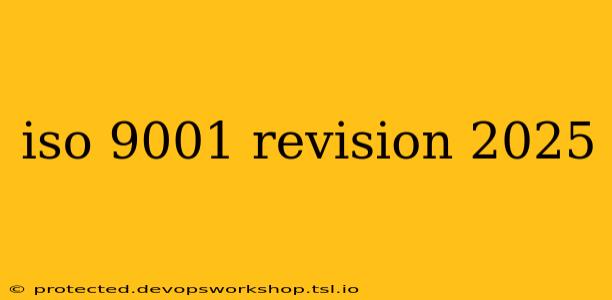The ISO 9001 standard, the internationally recognized benchmark for Quality Management Systems (QMS), is undergoing a revision, slated for release around 2025. While the exact details are still under development, we can anticipate key changes based on current trends and ISO's stated goals. This post will explore the likely modifications, their implications for businesses, and how organizations can prepare for a smooth transition.
What's Driving the ISO 9001 Revision?
Several factors are driving the need for a 2025 revision:
- Evolving Business Landscape: The global business environment is dynamic, shaped by technological advancements, globalization, and increasing pressure for sustainability and ethical practices. The current ISO 9001:2015 standard needs to reflect these shifts.
- Increased Focus on Risk Management: Modern businesses operate in increasingly complex environments with higher levels of risk. The revision will likely place a stronger emphasis on proactive risk management and resilience.
- Alignment with Other ISO Standards: ISO is striving for greater alignment across its various management system standards. The 2025 revision will likely enhance compatibility with standards like ISO 14001 (environmental management) and ISO 45001 (occupational health and safety).
- Digital Transformation: The growing influence of digital technologies on business operations necessitates updates to address data security, cybersecurity, and the use of digital tools within the QMS.
Anticipated Changes in ISO 9001:2025
While specifics remain confidential until the official release, we can anticipate several key changes:
1. Enhanced Focus on Resilience and Risk Management
Expect a more robust framework for identifying, assessing, and mitigating risks throughout the organization. This will likely involve incorporating a more proactive approach to risk management, going beyond reactive measures.
2. Strengthened Emphasis on Data-Driven Decision Making
The revised standard will likely demand a greater reliance on data analysis to monitor, measure, and improve the effectiveness of the QMS. This includes using data to make informed decisions and demonstrate continuous improvement.
3. Increased Integration of Technology
The role of technology in quality management will be more prominent. This could involve using digital tools for documentation, data analysis, and process automation. The standard might offer clearer guidance on managing data security and cybersecurity risks associated with the use of these technologies.
4. Greater Focus on Sustainability and Ethical Considerations
Environmental and social responsibility are becoming increasingly important. The revision may incorporate clearer expectations regarding sustainability practices and ethical considerations within the QMS.
5. Simplified Language and Structure
While maintaining rigor, the ISO anticipates making the standard easier to understand and implement for organizations of all sizes.
Preparing for the ISO 9001:2025 Transition
Proactive preparation is crucial for a smooth transition:
- Stay Informed: Monitor official ISO announcements and industry news for updates on the revision.
- Internal Gap Analysis: Conduct a thorough assessment of your current QMS to identify areas that need improvement in anticipation of the new requirements.
- Engage Stakeholders: Involve all relevant stakeholders in the transition process, including employees, management, and clients.
- Invest in Training: Ensure that your team has the necessary training and knowledge to understand and implement the updated standard.
- Update Documentation: Begin reviewing and updating your existing documentation to align with the anticipated changes.
Conclusion
The ISO 9001:2025 revision presents both challenges and opportunities for organizations. By proactively preparing for the changes, businesses can ensure their QMS remains effective, efficient, and aligned with the evolving global landscape. Embracing the anticipated updates is not just about compliance; it's about strengthening your organization's ability to adapt, innovate, and thrive in an increasingly complex and competitive market. The sooner you begin your preparation, the smoother the transition will be.

